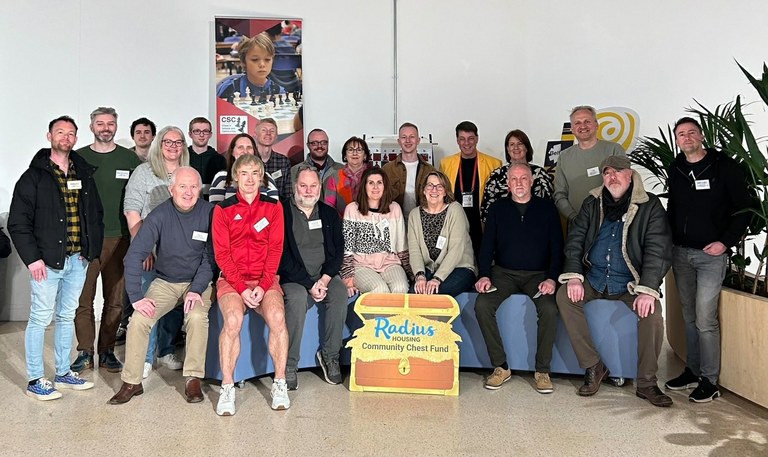Chess in Schools and Communities Tutor Training Day at 2 Royal Avenue
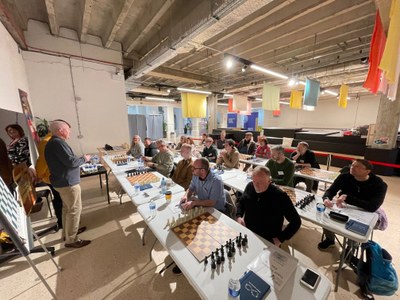
The event was a one-day course, organised by Paul O’Connor of Roaming Knights and Belfast City Chess for 18 participants from all across Northern Ireland. Paul successfully secured the venue free of charge for the training, as well as sponsorship for each participant meaning the course was entirely free.
Our huge thanks go to Paul and event sponsors, Radius Housing and Lisburn Chess Club, supported by 2RA, Yallaa Café, and Belfast City Council Community Engagement.

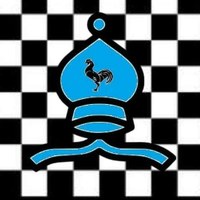
On a wet, Saturday morning, participants arrived at 2RA to find a cordoned-off area for the day’s event, prepared with set-up boards, notebooks and information packs. You really couldn’t help but appreciate and admire Paul’s efforts.
For those of you who have not yet heard of or been to 2RA, it is a ‘community and cultural hub which provides a free creative space in the heart of the city centre.’ Sharyn Ruseckas, Duty Manager, shared her thoughts with us on hosting the event:
“2 Royal Avenue is absolutely delighted to have the wonderful opportunity to support the Belfast learning festival by hosting today’s Chess in Schools & Communities Tutor Training Day, the first of its kind anywhere in Northern Ireland. We fully appreciate how much initiatives like this give back to our communities, and the positive impacts that they have for all people, young and old alike. We are honoured to play a role in whatever way we can.”
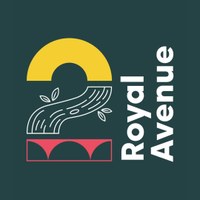
Training kicked off with introductions from Paul and the day’s tutors, Sean Marsh and Catherine Lloyd, as well as getting to know the participants who came from different backgrounds & locations.
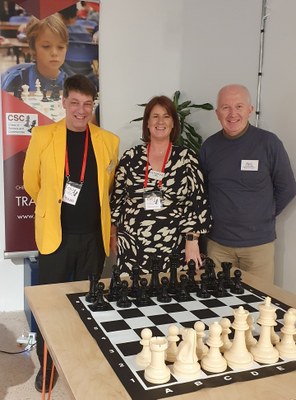
A little about our tutors:
Sean Marsh
Chief Trainer for Chess in Schools and Communities, Regional Organiser for Teesside (North East England), chess tutor since 1998, and if you think his name is familiar, that’s because he is also a writer. Sean is the author of ‘Batsford’s Chess Bible. From beginner to winner with moves, techniques and strategies’.
Catherine Lloyd
Catherine is also a tutor in the Teesside area and works in many schools, including Pupil Referral Units. Catherine has been delivering tutor courses alongside Sean for a couple of years now.
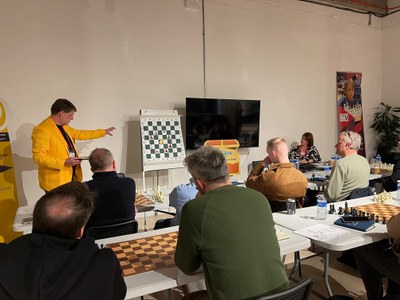
With the formalities out of the way, participants got stuck straight into how to make that very first introduction of chess to newcomers – the chess board. We’ve all seen one, but how often do we stop and just think about it? Chess board components may be obvious to us as players or onlookers, however they are not so easily spotted to those new to the game. To start off, learners simply observe an empty chess board for a half a minute or so, and see what they can pick up such as number of squares and ‘coordinates’ of the squares, before introducing each piece one by one.
Participants learned the best way to introduce each piece, covering how they move and capture as well as their 'value' or strength. The suggested order of introducing the pieces was: pawn, bishop, rook, queen, king, and finally the knight. The CSC curriculum dedicates a whole lesson (one a week) to each piece!
A variety of mini games were recommended that a newcomer can play to familiarise themselves with the pieces before moving onto the game itself, we have included some examples below.
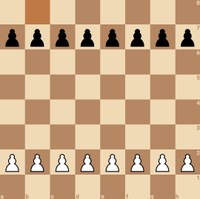 Winner: First one to 'promote' the pawn or capture all opponent's pawns. If pawns can no longer move, the winner is the one who has made the last move.
Winner: First one to 'promote' the pawn or capture all opponent's pawns. If pawns can no longer move, the winner is the one who has made the last move.
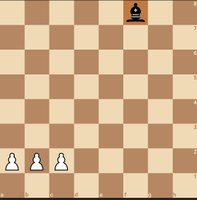 Winner: Black must capture all pawns / White must 'promote' a pawn or capture Bishop
Winner: Black must capture all pawns / White must 'promote' a pawn or capture Bishop
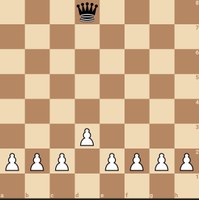 Winner: Black must capture all pawns / White must 'promote' a pawn or capture Queen
Winner: Black must capture all pawns / White must 'promote' a pawn or capture Queen
Once the pieces are introduced, concepts of check, checkmate and stalemate (focusing on the ABCs: avoid, block, capture) can be demonstrated followed by special moves, such as en passant, castling, and pawn promotion.
Most of us will know someone who knows the rules, but may still struggle with improving their game, thinking ahead or spotting those crucial tactics. Sean & Catherine covered the idea of ‘quests’ within teaching chess, the idea of which is get a newcomer to think ahead. An for example of this was provided by asking one side to continuously capture a piece until all the pieces are gone. A couple of examples below:
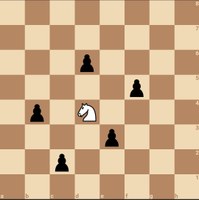 Knight must capture all pawns without going back onto an empty square (thinking ahead 5 moves)
Knight must capture all pawns without going back onto an empty square (thinking ahead 5 moves)
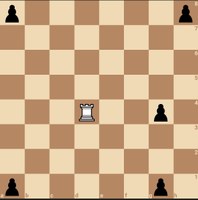 Rook must capture all pawns without going back onto an empty square (thinking ahead 5 moves)
Rook must capture all pawns without going back onto an empty square (thinking ahead 5 moves)
Once the player is a little more advanced, tutors can move onto chess variations such as ‘pirate’s chess’ or ‘crusher chess’ for something a bit different. Rules explained below should you wish to try them!
Pirate's Chess: aim of the game is to 'give up' every piece, including the King. Pawn Promotion: variation 1) pawn does not promote, instead is removed from board; variation 2) pawn promotes to bishop, knight or rook.
If a player can no longer make a move due blocked pieces, the winner is the one with fewer pieces.
Crusher Chess: First 10 moves (each) are made as normal, after which the first 'crush' happens (green arrows) removing any pieces on those squares; players can no longer move onto the 'crushed' squares. Another 10 moves are made before another 'crush' further restricting the board (red arrows).
Players must ensure their King is not in the 'crush' zone or they will lose. A player who's king is in the centre before the final 'crush' (blue arrows), wins.
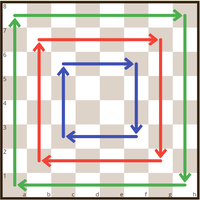
As well as covering the basics of chess, Sean & Catherine took time to go over a number of available resources which you may have at your disposal in helping you to teach chess, such as a free e-demo board via logiqboard.com.
We really are lucky to have many free resources available thanks to technology such as Chess.com or Lichess which have their own benefits, but those also worth noting are on the website of Delancey UK Chess Challenge – resources available for both teachers and students!
You may also wish to join Chess in Schools and Communities itself, to avail of many wonderful resources, including their own workbooks, as well as log in credentials for ChessKid.com.
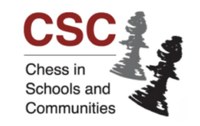
There certainly was a lot to include in a day’s training and we couldn’t be more grateful to Paul, Sean, and Catherine for their time and efforts to cover as much as possible. The UCU asked Paul to share his thoughts on how the thought it all went:
“Following an enquiry to the mainland UK chess charity, Chess in Schools and Communities, about chess tutor training and an unexpected invitation from Belfast City Council for chess events that could form part of the Belfast Learning Festival 2024, a flurry of emails resulted in CSC agreeing to send two trainers in April, 2 Royal Avenue offering us a free venue, Radius Housing and Lisburn Chess Club sponsoring 18 participants and Yallaa Café (in 2RA) kindly sponsoring us with free refreshments on the day. Participants, of all skill levels, including non-chess players, teachers, teaching assistants and chess group organisers, came from all across Northern Ireland. The trainers, Sean Marsh and Catherine Lloyd are delighted with the response and we are already tentatively discussing future CSC trainings in Northern Ireland including, hopefully, one in L'Derry city in the autumn.”
We couldn’t leave out the tutors themselves, who also shared their thoughts with us:
‘We were absolutely thrilled and extremely excited to be able to deliver the first-ever CSC Training Day in Northern Ireland, helped considerably by the excellent efforts of Paul O’Connor. The hope is to be able to develop the project further and we have lots of exciting ideas and plans to discuss and hopefully bring to fruition. Yesterday’s training day brought 18 very keen delegates from far and wide, all of whom gave us a great welcome and worked hard all day. Thank you, Belfast for such a great day.’
We often forget how fortunate we are as a chess community here in Ulster to have many members like Paul, who go above and beyond expectations, and this has been a wonderful example of our member’s work. As for CSC … we hope this is only the beginning of a valuable partnership with us here in Ulster.
